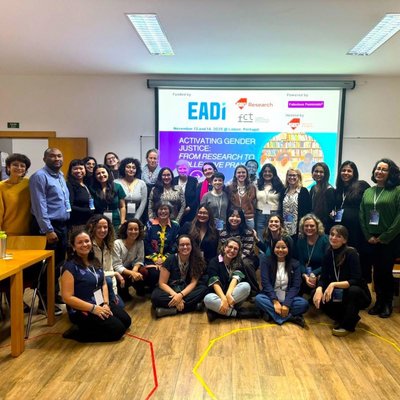Reactivating the Gender Justice Working Group: Reflections from the 2025 Gender Lab
Thanks to the Innovation Fund promoted by EADI in the first semester, the Gender Justice Working Group (GJWG) held its first Gender Lab in Lisbon on November 13 and 14—an important step in reactivating the network’s collective work on gender, intersectionality, and decolonization within development research. Hosted at ISEG – Lisbon School of Economics and Management, the event brought together 33 participants representing 21 countries (here is their information), with strong participation from scholars and practitioners from the Global South and working on Global South contexts.
Several participants were affiliated with EADI member institutions, including the Centre for African and Development Studies CEsA, University of Birmingham, International Institute of Social Studies ISS, and, Centro de Administração e Políticas Públicas CAPP, reinforcing the central role of the Working Group as a space where institutional members and independent researchers can exchange knowledge and collaborate.
The one-anad-a-half-day programme opened with a dialogue between Enrica Duncan (Mapa do Acolhimento, Brazil) and Evangelina Martich (Universidad Camilo José Cela and UN Consultant), exploring how academic research and feminist activism can mutually reinforce one another. This set the tone for the Lab’s focus on bridging conceptual and practical approaches to gender justice.
The sessions invited participants to critically examine their own positionalities and to engage deeply with intersectional, feminist, and decolonial epistemologies. These conversations highlighted the importance of methodological reflexivity and the need to confront knowledge hierarchies that persist in development studies.
On the second day, participants worked in thematic groups to translate discussions into emerging collaborative initiatives. These included proposals for community-based toolkits, joint publications, podcast episodes, arts-based feminist projects, climate justice discussions, and mentorship circles aimed at supporting early-career researchers, senior practitioners and activists. Many participants also expressed interest in preparing contributions for the EADI 2025 General Conference in Antwerp, where the GJWG will host a dedicated seed panel.
EADI, ISEG Research and Fundação Ciência e Tecnologia FCT made it possible to partially fund traveling and accommodation for the participants as well as general logistics. There were 114 applications and being able to invite 33 participants only reinforced the idea of how much needed these spaces are for reflection but mainly for collective action. To move forward, the group of participants will meet monthly to work in smaller task groups to launch the projects and ideas mentioned throughout the lab.
Overall, the Gender Lab demonstrated how essential it is for EADI to sustain arenas where gender, race, class, coloniality, and power can be examined collectively and critically. These issues do not disappear when unaddressed; they become silent. The Gender Justice Working Group aims to keep that silence broken by fostering dialogue, knowledge sharing, and collaborative research grounded in feminist and decolonial principles.
The group will reconvene on 29 November to structure working clusters and develop follow-up activities. Researchers, practitioners, and students from EADI member institutions are warmly invited to join the Working Group and contribute to its next phase. Please, fill in this form to receive more information: https://forms.gle/mgCgXK5As5SxR7R16
If you have any questions, you can contact the Gender Justice Co-convener, Daniela Pardo-Yepez: dpardo@edu.ulisboa.pt.


